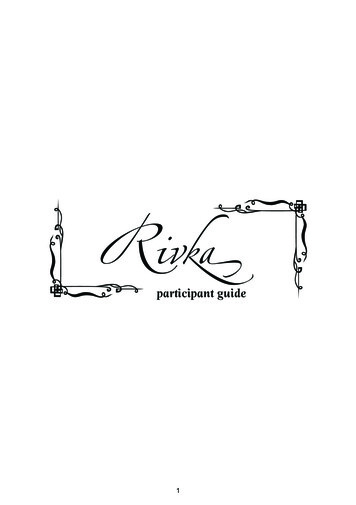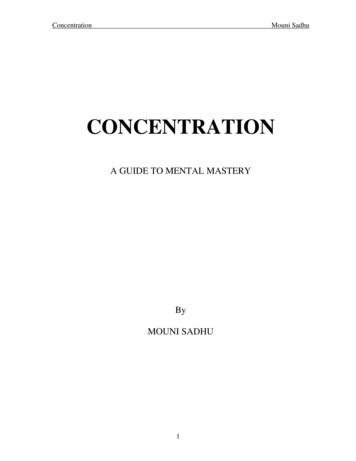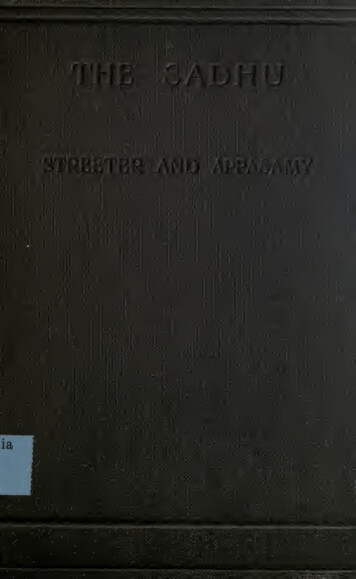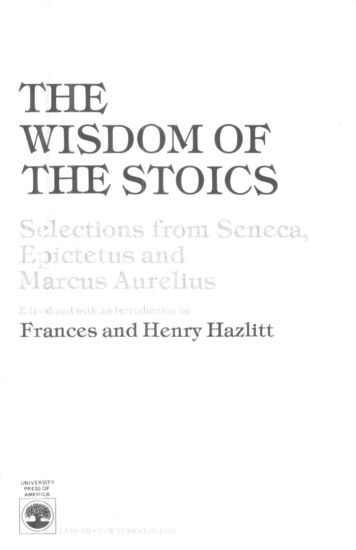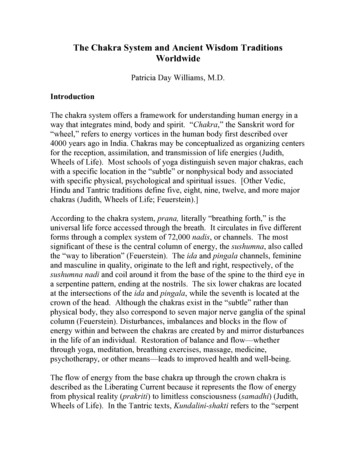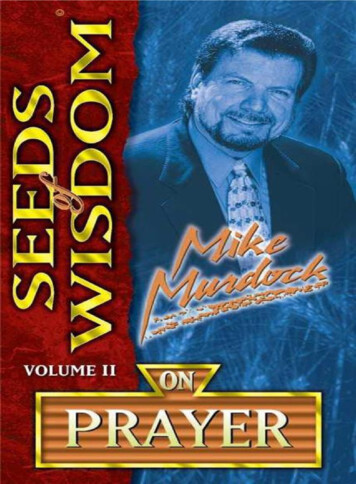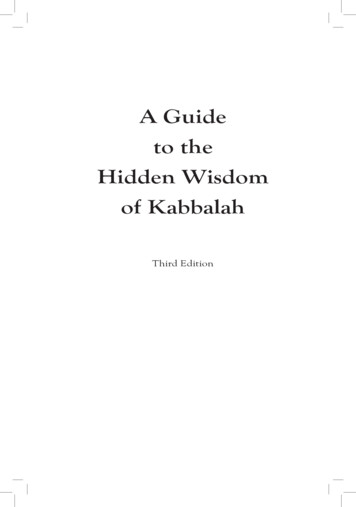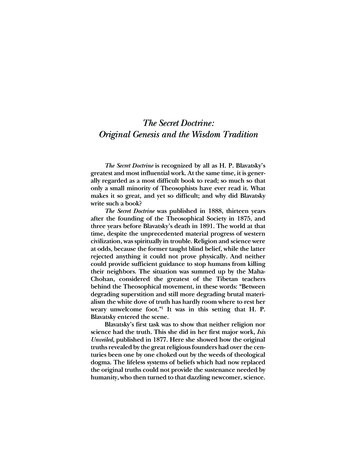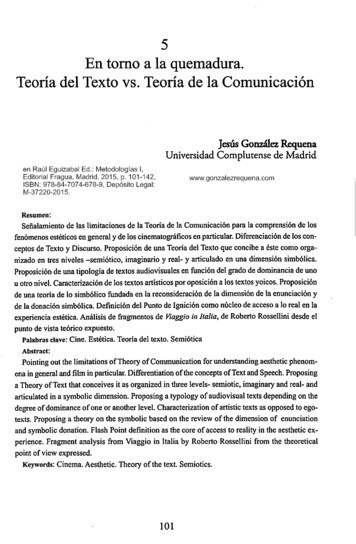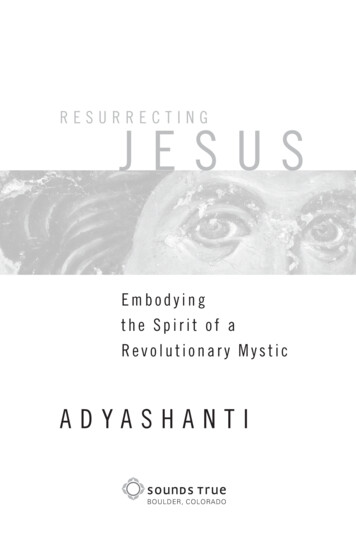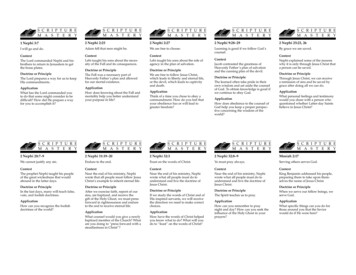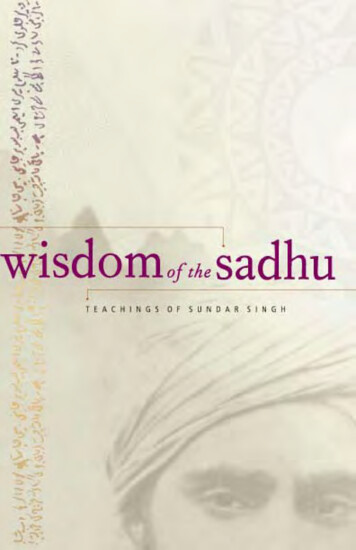
Transcription
wisdom of the sadhuT E A C H I N G S O F S U N D A R S I N G Hcompiled and edited by kim comer
Please share this e-book with your friends. Feel free to e-mail it orprint it in its entirety or in part, but please do not alter it in any way. If youwish to make multiple copies for wider distribution, or to reprint portions ina newsletter or periodical, please observe the following restrictions: You may not reproduce it for commercial gain.You must include this credit line: “Copyright 2007 byPlough Publishing House. Used with permission.”This e-book is a publication of Plough Publishing House, Farmington, PA15437 USA (www.plough.com) and Robertsbridge, East Sussex,TN32 5DR, UK (www.ploughbooks.co.uk)Copyright 2007 by Plough Publishing HouseFarmington, PA 15437 USAAll Rights Reserved
C O N T E N T Sto the readerI .viiS C E N E Sthe hungry birds 2dharma devotion 4five holy men 9maya illusion 4the saint 0santi peace 5the scholar 0jnana knowledge 3I I. C O N V E R S A T I O N Sthe pilgrim 2darshana the divine presence 48avatara incarnation 1the lovers 68karma bondage 76moksa release 85the prince and the thief 1dyva vileenam oneness with goddhyanam contemplation 1598
three seekers 3seva service 25tapas suffering 1the king and the farmer 54amrita eternity 63a warning to the west 72seeker and master 1background and context 8 sources 196
Seek not to understand so that thoumayest believe, but believe so thatthou mayest understand.Augustine of Hippo
to the readerwww.Bruderhof.com to the readerAs a large, red sun rises from thePunjabi plains, the solitary figure of a sadhu – an In dian holy man – comes into view, trudging along adusty road. In another frame the figure appears again,this time toiling to reach a remote Tibetan villagealong a narrow, icy track better suited for goats thanfor humans. In yet another, the man appears at theedge of an ancient marketplace at dusk, mingling withthe crowd as he seeks a place to sit and rest. Whereverthis sadhu appears, those who look into his eyes im mediately sense his extraordinary humility and peace.They discover a mystic Just as Sundar Singh appeared in such scenesagain and again – without prior announcement, with out introduction, without credentials – so he appearsin this book. “Scenes,” the first section, contains im pressions from key events in his life. It is based bothon accounts by Sundar Singh himself, and by writerswho knew him. “Conversations,” the second, con tains dialogues that draw freely on material from all
six of Sundar Singh’s books, as well as interviews andarticles. Both sections are interspersed with parablesthat punctuate the themes. Though structurally un usual, the resulting collage allows us to encounter thesadhu in the way his contemporaries did: not as a sys tematic thinker, but as a personal teacher.In his teachings as in his life, Sundar Singh offerslittle by way of rational orientation. He defies catego rization and critical analysis. The impact of his mes sage, however, is always direct and immediate. Hisvoice rings with a clarity that rises from the deepest,clearest sources of life itself.K. C. to the readerwww.Bruderhof.com
. s c e n e swww.bruderhof.com
P A R A B L Ethe hungry birdsOnce as I wandered in the mountains, Irock to rest and look out over the valley, I saw a nest in thebranches of a tree. The young birds in the nest were cryingnoisily. Then I saw how the mother bird returned with food forher young ones. When they heard the sound of her wings andfelt her presence nearby, they cried all the more loudly andopened their beaks wide. But after the mother bird fed themand flew away again, they were quiet. Climbing down to lookmore closely, I saw that the newly hatched birds had not yetopened their eyes. Without even being able to see their mother,they opened their beaks and begged for nourishment when ever she approached.www.bruderhof.comthe hungry birdscame upon an outcropping of rocks, and as I sat on the highest
These tiny birds did not say: “We will not open our beaksuntil we can see our mother clearly and also see what kind offood she offers. Perhaps it is not our mother at all but insteadsome dangerous enemy. And who knows if it is proper nour ishment or some kind of poison that is being fed to us?” If theyhad reasoned thus, they would never have discovered thetruth. Before they were even strong enough to open their eyes,they would have starved to death. But they held no suchdoubts about the presence and love of their mother, and soafter a few days, they opened their eyes and rejoiced to see herwith them. Day by day they grew stronger and developed intothe form and likeness of the mother, and soon they were ableto soar up into the freedom of the skies.beings, but do we not have something to learn from thesecommon birds? We often question the reality and the lovingnature of God. But the Master has said: “Blessed are thosewho have not seen and yet believe.” Whenever we open ourhearts to God, we receive spiritual nourishment and growmore and more into the likeness of God until we reach spiritualmaturity. And once we open our spiritual eyes and see God’spresence, we find indescribable and unending bliss.www.bruderhof.comdharmaWe humans often think of ourselves as the greatest living
dharmadevotionCandlelight flickers across the wornpages, and the Sanskrit characters dance rhythmically,like graceful maidens chanting ancient hymns. Trans fixed, the young boy follows their motion, and hissoul sings in unison with them:Quietly another voice enters the song. It is a gentle,beloved voice, calling him, calling “Sundar,” drawinghim out of the chant, away from the dance. Slowlyclosing his inner eyes, he looks up into the candlelitface of his mother. “Come, Sundar! It is past midnightalready. Soon it will be morning. You are only eightyears old, my son. You must rest.”www.bruderhof.com dharmaA mass of radiance, glowing all around,I see thee, hard to look at, on every side;Glory of flaming fire and sun, immeasurable,without beginning, middle, or end of power.Infinite arms, whose eyes are the moon and sun,I see thee, whose face is flaming fire,burning the whole universe with thy radiance.
Obediently, reverently the boy returns the holybooks to their place and seeks his mat. The candleflickers one last time and dies. Later he remembers:www.bruderhof.com dharmaAlthough my family was Sikh, we had great reverencefor the Hindu scriptures. My mother was a living ex ample of the love of God and a devoted follower ofHindu teachings. Every day she awoke before dawn,prepared herself with the cold water of the ritual bath,and read either from the Bhagavad Gita or from one ofthe other sacred writings. Her pure life and her com plete devotion influenced me more strongly than it didthe other family members. From the time of my earliestmemories, she impressed upon me one rule above allothers: when I woke from sleep, my first duty was topray to God for spiritual nourishment and blessings.Only then could I break the night’s fast. Sometimes Iobjected to this rule and insisted on having breakfastfirst, but my mother would never relent. Usually withcoaxing, but when necessary with force, she impressedthis rule deep onto my soul: Seek God first and onlythen turn to other things.At that time, I was too young to recognize the truevalue of this education, and I resisted her. Later, how ever, I came to appreciate her example. Whenever Ithink back now on her loving guidance, I cannot thank
God enough for her. For she planted in me, and tendedin my early life, a profound love and fear of God. Shecarried a great light within her, and her heart was thebest spiritual training anyone could have: “You mustnot be careless and worldly,” she would say. “Seekpeace of soul, and love God always. Someday you mustgive yourself fully to the search, you must follow theway of the sadhu.”With pleading eyes, the boy looks up at his father:Sardar Sher Singh retorts:Listen, Sundar! Over the years I have given that widowall manner of help. We are not responsible for her. Theother people in town should also help look after her.They must also learn charity. You cannot be respon sible for everyone all the time. Others must learn toplay their part. Do not worry about her now. You havedone more than enough for her.www.bruderhof.com dharmaPlease help her, Father! She is so old and the weather isturning cold. I spent all my pocket money to buy foodfor her, but I did not have enough for a blanket. Pleasegive me money to buy her a blanket.
Downcast, the boy turns away. Agony of conscience.Has not Mother always said we should show compas sion and pity? Has Father no heart? What if no one elsehelps her? She might freeze in the night. Is there noth ing I can do? Maybe No, I mustn’t! That would bewrong. But then again, Father has so much; he willnever miss a few rupees. It is for a good cause; I’m notstealing for myself It is evil. The holy books speak of karma – the relent less cycle of sin and death by whose law every sinful actwww.bruderhof.com dharmaSundar was wrong. Father does miss it. In theevening, Sardar Sher Singh calls together the house hold and announces that he is missing five rupees.“Has anyone taken money from my purse?” he asks,gently but firmly. Each one answers in turn. Sundarquietly says, “No Father, I didn’t do it.” The day closessomber and unresolved.Sundar sleeps fitfully. He tosses and turns. In hisdreams, he sees the stern face of his father, hears thedisappointment in his voice: “How could you stealfrom me, your father? How could you secretly dis obey me? Even now, after I ask for the truth, still youlie to me.” Sundar knows this is not dharma – devo tion. This is adharma – sin.
burdens the soul and carries painful consequences. Theholy books warn that we will reap what we sow, in thislife or the next. How can I escape this karma? How canI undo what I have done? What good is compassion forothers in need if my own soul is burdened?Sardar Sher Singh hears a quiet, frightened voice:Father! Wake up, Father! Something terrible has hap pened. It was I, Father. I stole your money to buy ablanket for the widow. Forgive me, Father. I want to es cape the karma; I am ready to accept punishment; I amready to accept it as penance for this sin.www.bruderhof.com dharmaNow awake, Sardar Sher Singh sees the anguish in theboy’s face and sees the hours of anguish behind it. Hetakes hold of the boy – not to punish him, but to takehim up into his strong arms; not with anger, but withlove. Gently he says: “I have always trusted you, mychild, and now I have good proof that my trust wasnot misplaced. Sleep in peace now, for you haveshown courage to choose what is right. In this way,you have turned the wrong to good. I, too, am sorrythat I refused you money for the widow. I will notrefuse you such a request again.”
P A R A B L Efive holy menOnce in Haridwar I met a sadhu lying on awound and torture yourself so?” He answered:You are a sadhu yourself. Do you not know why I do this?It is my penance. I am destroying the flesh and its desires.I serve God in this way, but I still feel all too clearly thepain of my sins and the evil in my desires. Indeed, thepain of them is far worse than the pain of these nails. Mygoal is to kill all desire and so to find release from myselfand oneness with God. I have been exercising this disci pline for eighteen months, but I have not yet reached mygoal. Indeed, it is not possible to find release in such awww.bruderhof.comfive holy menbed of nails. I went to him and asked, “To what end do you
short time; it will take many years, even many lives, be fore I can hope for release.I considered the life of this man. Must we torture ourselvesthrough many lives in order to find true peace? If we do notreach our goal in this life, why should there be another chancein another life? Is it even possible in thousands on thousandsof lives? Can such peace ever be found through our own ef forts? Must it not be a gift from God? Surely we must seek thelife of God, not the death of flesh.I met another sadhu doing penance. His feet were tiedwith a rope and he was hanging upside down from the branchof a tree. When he had ended his exercise and was resting un der the tree, I asked him, “Why do you do this? What is the purpose of such torture?” He answered:five holy menPeople are greatly amazed to see me hanging head-downfrom a tree, but remember, the Creator sets every childhead-down in the mother’s womb. This is my method toserve God and do penance. In the eyes of the world it isfolly, but in this exercise I remind myself and others thatall of us are bound by sin and lead lives that are, in God’seyes, upside down. I seek to turn myself upside downagain and again until in the end I stand upright in thesight of God.It is true that the world is upside down and its ways are per verted. But can we ever hope to right ourselves through ourwww.bruderhof.com
own strength? Must we not turn instead to God, who alonecan set right what is wrong and free us from evil thoughts anddesires?Later, I met yet another sadhu. In the hot summer, hewould continually sit within the five fires – that is, with fourfires around him and the burning sun overhead. In winter hewould stand for hours in the icy water. Yet his whole expres sion was marked by sadness and despair. I learned that theman had been undergoing this exercise for five years. I ap proached him and asked: “What have you gained from thisdiscipline? What have you learned?” He answered sadly, “I donot hope to gain or learn anything in this present life, andabout the future I can say nothing.”an oath of silence. He was a genuine seeker after truth. He hadnot spoken for six years. I went to him and asked him ques tions: “Did God not give us tongues so that we can speak?Why do you not use yours to worship and praise the Creatorinstead of remain
sadhu in the way his contemporaries did: not as a sys tematic thinker, but as a personal teacher. In his teachings as in his lif e, Sundar Singh offers little by way of rational orientation. He def ies catego rization and critical analysis. The impact of his mes sage, however, is always direct and immediate. His voice rings with a clarity that rises from the deepest, clearest sources of .
